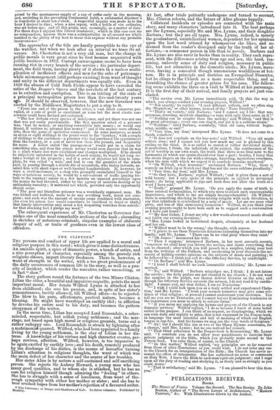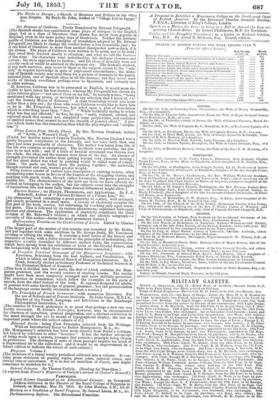PUBLICATIONS RECEIVED.
BOOKS.
The Stones of Venice. Volume the Second. The Sea Stories. By John Ruskin, Author of "The Seven Lamps of Architecture," "Modern Painters," &c. With Illustrations drawn by the Author. The Turks in Europe ; a Sketch of Manners and Politics in the Otto- man Empire. By Bayle St. John, Author of "Village Life in Egypt,"
&c.
Six Dramas of Calderon. Freely Translated by Edward Fitzgerald. ['rhos Spanish drama has contributed sonic plays of intrigue to the English stage, but as a chum of literature that drama has never been popular in England, even in the more palmy days of theatricals. Neither the intrinsic merits of Calderon nor the principles of translation adopted by Mr. Edward Fitzgerald are likely to change the verdict before a less favourable jury ; fin if one kind of literature is more than another disregarded now-a-days, it is the drama. The plays of Calderon were written to be acted, not to be read ; they owed their interest mostly to situation, and what we call the business of the stage : his characters want individuality, his dialogue closeness and nature ; his style approaches to fustian ; and his ideas of morality were not exactly such as would be admired in the present day. The dramatic student, if any such survives, may recur to them as the surgeon recurs to the "sub-
ject," to acquire knowledge in spite of unpleasant concomitants ; the histo- rian of Spanish society may read them for a picture of manners in the purely national plots, and of Spanish ideas in all the dramas ; but they never were works of literary excellence perhaps even to Spaniard; and certainly not to other nations.
If, however, Calderon was to be presented in English, it would seem de- sirable to have taken his best dramas ; whereas Mr. I'itzgerald has chosen six of his inferior plays—" not one of those on my list," he naively writes, "being mentioned with any praise, or included in any selection that I know of, ex- cept the homely Mayor of Zalamea." A close translation would also seem better than a free one for those who want Calderon would like to have him as he ill. Mr. Fitzgerald, however, has acted upon a plan of translation which is something more than "free." " While faithfully trying to retain what was fine and efficient," he has, he says, "sunk, reduced, altered, and replaced much that seemed not, simplified some perplexities, and curtailed or omitted scenes that seemed to mar the breadth of general effect." A pro- cess which looks less like translation than what the playwrights call "adapta- tion."] Stray .Leaces from Shady Places. By Mrs. Newton Crosland, Author of"Lydia, a Woman's Book," &c. [Under her maiden name of Camilla Toulmin, Mrs. Newton Crosland was a pretty frequent contributor to the Annuals, and her tales both then and since had some peculiarity of character. The matter was taken from life, if the life was common or exceptional. The incidents were probable, the per- sons to be met with ; and if a little of boudoir sentiment was thrown over the whole, the ideas and the manner were those of the day. An absence of strength prevented the author from getting beyond very pleasant writing ; but her great defect was what in painting would be called want of compo- sition : the parts are better than the putting together ; the materials, though natural and real, wanted greater weight. Stray _Leaves consist of various tales descriptive of existing society, often inculcating some lesson in favour of the humble or the struggling classes, and painting with much truth, though rather favourably, the poorer portion of middle life. The characteristics of the tales are those we have already de- scribed as belonging to the author, but the subjects enter into the struggles of necessitous lifer and more fully than Annual refinement might allow.] Electric Science; its History, Phrenomena, and Applications. By F. C. Bakewell, Author of "Natural Evidence of a Future Life," &c. [An elementary book containing a great quantity of matter, well arranged, and clearly presented in a small space. A history of electricity occupies the il.st part of the book, concise, but informing, by touching only upon essen- tial parts. This is followed by its various phrenomena, explained with equal interest and clearness. The application of electricity constitutes the third division of Mr. Bakewell's treatise ; in which the electric telegraph—a specialty of this author—forms the most prominent feature.] Rudimentary Treatise on the Construction of Locks. Edited by Charles Tomlinson.
[The larger part of the matter of this treatise was furnished by Mr. Hobbs, and put together with some additions by Mr. George Dodd, Mr. Tomlinson revising or editing the whole. It contains a brief notice of the history and literature of locks, with a fuller account of the principles of lockmaking, the respective security furnished by different modern locks, the controversies which have sprung from the exhibition of locks at the Crystal Palace, and the lockpicking with which those controversies were connected.] A Complete Practical Grammar of the Hungarian Language; with
Exercise; Selections from the best Authors, and Vocabularies. To which is added, an Historical Sketch of Hungarian Literature. By J. Csink, formerly elected as Ordinary Professor of Technical Sciences at the Protestant School of Kesmark.
[This book is divided into two parts, the first of which contains the Hun- garian grammar, and the second consists of reading lessons. The matter might have been more compactly arranged and more skilfully presented. The exercises in translation, which follow the examples on the parts of speech, form the chief feature of the book. It appears designed for adults, or persona with sonic knowledge of general grammar ; but the pronunciation of the language seems hardly attainable without a master.] The Principles of French Grammar; with numerous Exercises. For the use of Schools and of Private Students. By Jules Caron' M.E.I.S., Teacher of the French Language and Literature in the Edinburgh Philosophical Institution, &c. [The number of French grammars is so great that perhaps a new one was hardly necessary. M. Caron's Principles, however, may be recommended for clearness of exposition, gradual progression, and a distinct exhibition to the mind through the eye by means of typographical display, the last an important point where the subject admits of it.] Edmund Burke : being First Principles selected from his Writings. With an Introductory Essay by Robert Montgomery, M.A., &c. [Mr. Moatgomery's selection has been made directly from Burke's writings, not helped by reference to other "beauties." It has the further advantage of being made upon a system, passages that contain a principle being chosen in preference. The shortness of some of these passages imparts too much of a fragmentary air to the collection ; and it would be an improvement in a future edition to indicate the source of each extract.] Diogenes. 'Volume I. [The numbers of a funny weekly periodical collected into a volume. It con- tains prose strictures on passing topics, prose jokes, satirical verses, and jocular cuts or caricatures. It is in fact an imitation of Punch, and might sometimes be mistaken for it.] Samuel Johnson. By Thomas Carlyle. (Reading for Travellers.) [A reprint from Fraser's Magazine of Carlyle's review of Croker's Boswell.] PAMPHLETS.
Logical Science Considered as an Educational Element : an Inaugural Address delivered in the Theatre of the Royal College of Surgeons in Ireland, on Monday, May 23, 1863. By John Murray, A.M., LL.D. History as a Condition of Social Progress. By Samuel Lucas, M.A., &c. Parliamentary Reform. The Educational Franchise.
Esq., ALP. By Alfred B. Richards, Esq. Fourth edition.
A Proposal to Establish a Missionary College on the North-west Coast of .:British America. By the Reverend Charles Grenfell Nicolay, F.R.G.S., Librarian of King's College, London.
Speech on a Motion for Leave to bring in a Bill to Amend the Law re- specting Church-Rates. By Robert Phillimore, M.P. for Tavistock. Cobden and his Pamphlet Considered; in a Letter to Richard Cobden,



























 Previous page
Previous page